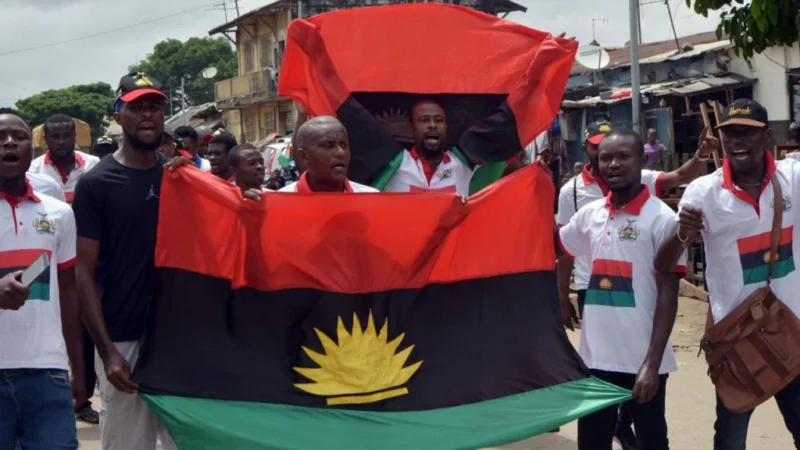Commercial activities across several states in Nigeria’s South-East region were brought to a standstill on Monday, October 21, 2024, following a sit-at-home action.
Although many assumed the shutdown was in line with the usual directives from the Indigenous People of Biafra (IPOB), the group has publicly denied ordering the strike.
The widespread shutdown in key South-Eastern cities like Aba, Umuahia, and Owerri caused disruptions to daily life. In Aba, Abia State, banks, schools, markets, and most business establishments remained closed throughout the day.
Major roads, such as Azikiwe, Faulks, Ngwa, and Aba-Owerri roads, were deserted, leaving streets eerily quiet. Combined teams of police officers and soldiers were seen patrolling major areas, possibly to prevent any unrest or enforce order.
The capital city of Abia State, Umuahia, also witnessed an overwhelming response to the sit-at-home. Streets were almost completely deserted, with limited human and vehicular activity.
There were only sporadic movements from tricycles and a handful of private vehicles. Schools across the city remained closed, with many institutions informing students in advance that they would not open on both Monday and Tuesday. Banks also did not open to customers, and only a few small street vendors dared to open their shops for business.
Authorities, including the police, were visibly present in Umuahia as well. Armored Personnel Carriers (APCs), patrol vans, and SUVs, one of which was suspected to belong to the state’s Commissioner of Police, were seen moving around the city’s major roads. Despite the complete shutdown of commercial activities, no violent incidents were reported in the area, making the day pass in relative calm.
In Owerri, the capital of Imo State, residents were greeted by empty streets as early as 6 a.m. Banks, shops, eateries, and local markets such as Relief Market and Eke Ukwu Market remained closed, paralyzing business in the city. Even transport companies along the busy Egbu Road failed to open, halting intercity travel.
Adding to the tension was a viral video circulating on social media, allegedly showing an attack in Okigwe, Imo State, where several vehicles were set on fire. The video caused widespread concern, with many believing it was part of the sit-at-home enforcement.
However, Imo State Police Public Relations Officer, Henry Okoye, swiftly debunked the claims. He clarified that the video was an old one from 2022 and that its recirculation was the work of “mischief makers” aiming to create fear and confusion.
Okoye stated: “The Imo State Police Command is issuing this statement in response to a recent viral video showing vehicles set ablaze by individuals affiliated with IPOB/ESN enforcing an unlawful sit-at-home order in Okigwe on 21/10/2024. The command confirms that this video is misleading; the incident depicted actually occurred in 2022. Its recirculation is a calculated attempt by mischief makers to instill unnecessary fear and anxiety in the state.”
Meanwhile, IPOB, the group that has in the past ordered sit-at-home protests to demand the release of its leader, Mazi Nnamdi Kanu, has denied any involvement in the recent shutdown.
In a statement, IPOB’s Media and Publicity Secretary, Emma Powerful, made it clear that the organization did not issue any order for a sit-at-home on October 21 or 22. Powerful urged people to disregard such instructions, calling them the work of criminals trying to tarnish IPOB’s image.
He said, “IPOB did not order for two days sit-at-home and we don’t want to talk about it and we don’t want to create panic from inconsequential fellows. We didn’t want to write a press statement towards inconsequential order from infiltrators.”










